Related Research Articles

Live at the Apollo is the first live album by James Brown and the Famous Flames, recorded at the Apollo Theater in Harlem and released in 1963 by King Records.

This is a discography chronicling the musical career of James Brown. Brown joined Bobby Byrd's vocal group The Flames in 1953, first as a drummer, and then as leading front man. Later becoming The Famous Flames, they signed with Federal Records in 1956 and recorded their first hit single, "Please, Please, Please", which sold over a million copies.

"Please, Please, Please" is a rhythm and blues song performed by James Brown and the Famous Flames. Written by Brown and Johnny Terry and released as a single on Federal Records in 1956, it reached No. 6 on the R&B charts. The group's debut recording and first chart hit, it has come to be recognized as their signature song.
"There Was a Time" is a song written and performed by James Brown.

The Famous Flames were an American Rhythm and blues, Soul vocal group founded in Toccoa, Georgia, in 1953 by Bobby Byrd. James Brown first began his career as a member of the Famous Flames, emerging as the lead singer by the time of their first appearance professional recording, "Please, Please, Please", in 1956.
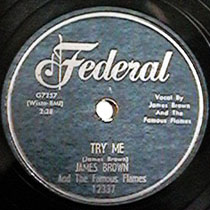
"Try Me", titled "Try Me " in its original release, is a song recorded by James Brown and The Famous Flames in 1958. It was a #1 R&B hit and charted #48 Pop - the group's first appearance on the Billboard Hot 100. It was Brown and the Flames' second charting single, ending a two-year dry spell after the success of "Please, Please, Please".
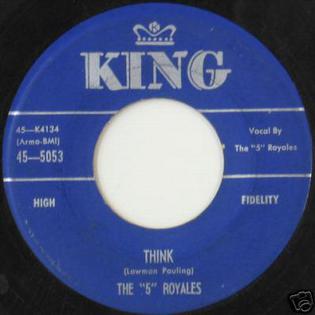
"Think" is a rhythm and blues song written by Lowman Pauling and originally recorded by his group The "5" Royales. Released as a single on King Records in 1957, it was a national hit and reached number nine on the U.S. R&B chart.

"Make It Funky" is a jam session recorded by James Brown with The J.B.'s. It was released as a two-part single in 1971, which reached No. 1 on the U.S. R&B chart and No. 22 on the U.S. Pop chart.
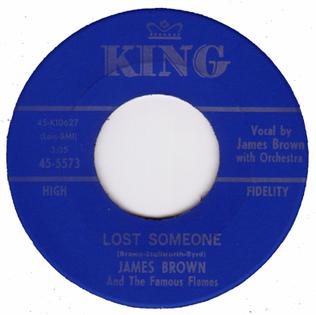
"Lost Someone" is a song recorded by James Brown in 1961. It was written by Brown and Famous Flames members Bobby Byrd and Baby Lloyd Stallworth. Like "Please, Please, Please" before it, the song's lyrics combine a lament for lost love with a plea for forgiveness. The single was a #2 R&B hit and reached #48 on the pop chart. According to Brown, "Lost Someone" is based on the chord changes of the Conway Twitty song "It's Only Make Believe". Although Brown's vocal group, The Famous Flames did not actually sing on this tune, two of them, Bobby Byrd, and "Baby Lloyd " Stallworth, co-wrote it with Brown, and Byrd plays organ on the record, making it, in effect, a James Brown/Famous Flames recording.
"Bewildered" is a popular song written in 1936 by Teddy Powell and Leonard Whitcup. It was a 1938 hit for Tommy Dorsey and His Orchestra.
"Oh Baby Don't You Weep" is a song recorded in 1964 by James Brown and The Famous Flames. Based upon the spiritual "Mary Don't You Weep", it was recorded as an extended-length track and released as the first two-part single of Brown's recording career. It peaked at #23 on the Billboard Hot 100 and at #4 on the Cash Box R&B Chart.. It was the last original song featuring the Famous Flames to chart, not counting the 1964 re-release of "Please, Please, Please" and the 1966 B-side release of the Live at the Apollo performance of "I'll Go Crazy".
"I'll Go Crazy" is a rhythm and blues song recorded by James Brown and The Famous Flames. Released as a single in 1960, it was Brown's fourth R&B hit, charting at #15. Brown and the Flames also performed it as the first song on their 1963 album Live at the Apollo.

Pure Dynamite! Live At The Royal is a 1964 live album by James Brown and The Famous Flames. Originally issued on King Records, it was the live follow-up to Brown's 1963 Live at the Apollo LP, and like that album, reached the Top 10 of the Billboard Pop album charts, peaking at #10. It was recorded live at the Royal Theatre in Baltimore, Maryland, a popular venue for R&B artists of the day. The album takes its title from Brown's most famous nickname at the time, "Mr. Dynamite".
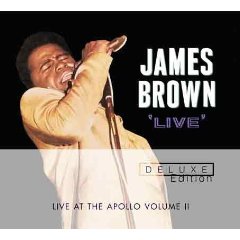
Live at the Apollo, Volume II is a 1968 live double album by James Brown and The Famous Flames, recorded in 1967 at the Apollo Theater in Harlem. It is a follow-up to Brown's 1963 recording, Live at the Apollo. It is best known for the long medley of "Let Yourself Go", "There Was a Time", and "I Feel All Right", followed by "Cold Sweat", which document the emergence of Brown's funk style. It peaked at #32 on the Billboard albums chart. Robert Christgau included the album in his "basic record library" for the 1950s and 1960s.
Robert J. Bennett, better known as Bobby Bennett, was an American singer, songwriter, choreographer, comedian, and musician, noted for being a member of the vocal group The Famous Flames from 1958 to 1968. During his time in the group, he served as a singer, songwriter, instrumentalist, comedian, emcee and dancer in the James Brown Revue. He was inducted into the Rock and Roll Hall of Fame as a member of The Famous Flames in 2012.
Lloyd Eugene Stallworth, also known as Baby Lloyd, was an American singer, songwriter, musician, recording artist, choreographer and dancer who was a member of the R&B vocal group, The Famous Flames, on King Records from 1958 to 1967. Stallworth was posthumously inducted into the Rock and Roll Hall of Fame in 2012 as a member of The Famous Flames.
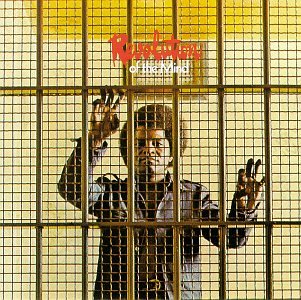
Revolution of the Mind: Live at the Apollo, Volume III is a live double album by James Brown released in 1971. As its subtitle suggests, it is Brown's third album recorded at the Apollo Theater, following the original Live at the Apollo (1963) and Live at the Apollo, Volume II (1968). After a triple album project recorded in France was cancelled because Brown had signed with a new label, Polydor, in 1971, Brown elected to do many of the same songs on a New York project. Unlike the cancelled live album, this was assembled from the best live takes from a week of shows, at the Apollo. Unlike previous releases live albums, this was criticized for poor sound balance and excessive eroticism. Note that “Escapism“/ “Make it Funky“, tracks four and five actually opened the show it was taken from. Despite flaws, it sold well and became one of the all-time most sampled sets.
"Maybe the Last Time" is a song written by James Brown and recorded by Brown and the Famous Flames in 1964. It was released as the B-side of "Out of Sight" and was also included on the Out of Sight album. Brown described it as "a heavy gospel-based number, all about appreciating friends and everything while you can because each time you see somebody may be the last time, you don't know." It was the last studio recording Brown made with the Famous Flames, although the singing group continued to perform live with him for several more years.
"Let Yourself Go" is a 1967 song by James Brown.
"I Guess I'll Have to Cry, Cry, Cry" is a song written and performed by James Brown. Released as a single in 1968, it charted #15 R&B and #55 Pop.